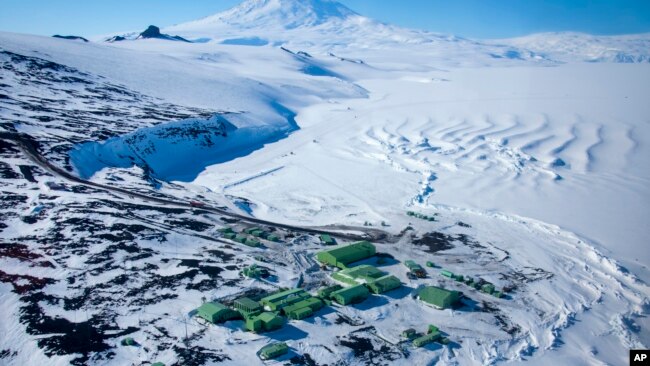民主主義の多数決を持ち込むことを控えれば、全会一致のルールとなります。
国家体制は、戦略的な側面も有り、特に現在の様な情勢では決着は難しいものです。
しかしながら、”地球を守る” ただ一つの目標は万人の、万国の願いのはずですが・・・・それさえも武器と化すのでしょうか?
VO0Aで英語を学びましょう!!
ロシアと中国、南極海保護計画を阻止(和訳)
Russia, China Block Plans for Antarctic Ocean Protections
November 08, 2022
ロシアと中国は、南極大陸周辺の広大な海域を漁業から保護する計画を再び阻止しました。これらの計画は、欧州連合(EU)、米国、および他の23カ国によって支持されています。
今回の措置は、先週オーストラリアで終了した南極海域の将来に関する2週間の国際会議でのことでした。
しかし、自然保護主義者たちは、この会議からいくつかの良い点が得られたと述べています。
その中には、krill fishingオキアミ漁の新たな保護に関する合意も含まれています。また、来年、南米のチリで新たな保護区の提案についてさらに話し合うことを約束、あるいは確約しました。これらの保護区を合わせると、南アジアのインドよりも広い海域をカバーすることになります。
ロシアと中国が提案に事実上拒否権を行使できることに、多くの国は不満を持っています。というのも、このグループのルールでは、行動を起こす前に、すべての国が合意すること、つまりコンセンサスに達することが要求されるからです。
米国は中国との共通点を見出そうとしています。そして、今年の不一致の責任をロシアに負わせました。米国は、ロシアがこのグループをundermining弱体化させていると指摘しています。
「入手可能な最善の科学的情報への繰り返されるロシアの拒否は、コンセンサスに基づく意思決定にparticipate参加するという約束の乱用に及んでいます」と国務省は声明で述べています。
ロシア政府関係者は、AP通信からのコメント要請には応じていません。
Pew Bertarelli Ocean Legacy Projectは、地元や政府の指導者、科学者、その他の団体と協力して、海洋保護区の設立に取り組んでいます。同団体は、オキアミ漁に関するいくつかの対策で合意したことを喜ばしく思うと述べています。オキアミは、ペンギンやアザラシ、クジラなどの動物や海鳥が食べる小さな生物です。
アンドレア・カバナー氏は、プロジェクトの南極と南洋のディレクターです。彼女は「”..オキアミの保護措置は良い最初の一歩だ...”と述べています。しかし、彼女は新しい情報は、ecosystem生態系に基づく漁業管理と海洋保護区の両方を用いるのが南氷洋の保全のために最良の方法である、と付け加えます。
今回集まったのは、南極海生物資源保存委員会(CCAMLR)と呼ばれるグループであす。この委員会のコンセンサスを得るのは、これまでも難しいことでした。しかし、ロシアがウクライナに侵攻してからは、さらに難しくなったのです。両国は同グループのメンバーです。
先週、ロシア当局者が話し始めると、集団下校退場で会議が始まりました。
コスティアンティン・デミアネンコ氏はウクライナの代表団を率いていました。先週、彼はAP通信に、ロシアにはこのテーブルにつく権利がないと語っていました。
「民間人を殺害し、他国の空と地上の民間インフラを破壊する国家は、CCAMLRのような国際機関の活動に参加する権利を制限されるはずです」と、デミアネンコ氏はオンラインメッセージに書いています。
Russia, China Block Plans for Antarctic Ocean Protections
Russia and China have again blocked plans to protect large areas of ocean waters around Antarctica from fishing. These plans are supported by the European Union, the United States, and 23 other nations.
The action came at the two-week international meeting on the future of Antarctica’s waters that ended in Australia last week.
However, conservationists said some good points came out of that meeting.
They included an agreement on new protections for krill fishing. And they included a promise, or commitment, to meet in the South American country of Chile next year to further discuss a proposal for new protected areas. Those areas combined would cover an area of ocean larger than the South Asian nation of India.
Many countries are not happy with the ability of Russia and China to effectively veto proposals. That is because the rules of the group require that every nation is in agreement, called reaching a consensus, before taking action.
The U.S. has been trying to find common ground with China. And it laid the blame for this year’s disagreements on Russia. The U.S. said the country was undermining the group.
“Russia’s repeated rejection of the best available scientific information amounts to an abuse of its commitment to participate in consensus-based decision-making,” the State Department said in a statement.
Russian officials did not respond to a request for comment from the Associated Press.
The Pew Bertarelli Ocean Legacy Project works with local and government leaders, scientists, and other organizations to establish protected ocean areas. The organization said it was pleased the group agreed on some measures around krill fishing. The small creatures are eaten by animals and seabirds like penguins, seals, and whales.
Andrea Kavanagh is director of the Project’s Antarctic and Southern Ocean work. She said, “… the krill conservation measure is a good first step…” But she added that new information shows the best method for Southern Ocean conservation uses both ecosystem-based fishery administration and ocean-protected areas.
The group which met is called the Commission for the Conservation of Antarctic Marine Living Resources (or CCAMLR). Finding consensus among the group has always been hard. But it has become even more difficult after Russia invaded Ukraine. Both countries are members of the group.
The meeting began last week with a mass walkout when the Russian officials started speaking.
Kostiantyn Demianenko led Ukraine’s delegations. Last week, he told The Associated Press that Russia had no right to be at the table.
“A state that kills the civilian population, destroys the air and ground civilian infrastructure of another country… should definitely be limited in its right to participate in the activities of international organizations such as CCAMLR,” Demianenko wrote in an online message.
Words in This Story
krill – n. very small creatures in the ocean that are the main food of some whales
commitment – n. a promise to do or give something
participate – v. to be involved with others in doing something: to take part in an activity or event with others
ecosystem – n. everything that exists in a particular environment
infrastructure – n. the basic equipment and structures (such as roads and bridges) that are needed for a country, region, or organization to function properly
definitely – adv. without doubt
